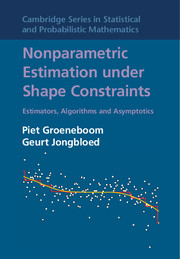Book contents
- Frontmatter
- Contents
- Preface and Acknowledgments
- 1 Introduction
- 2 Basic Estimation Problems with Monotonicity Constraints
- 3 Asymptotic Theory for the Basic Monotone Problems
- 4 Other Univariate Problems Involving Monotonicity Constraints
- 5 Higher Dimensional Problems
- 6 Lower Bounds on Estimation Rates
- 7 Algorithms and Computation
- 8 Shape and Smoothness
- 9 Testing and Confidence Intervals
- 10 Asymptotic Theory of Smooth Functionals
- 11 Pointwise Asymptotic Distribution Theory for Univariate Problems
- 12 Pointwise Asymptotic Distribution Theory for Multivariate Problems
- 13 Asymptotic Distribution of Global Deviations
- References
- Author Index
- Subject Index
11 - Pointwise Asymptotic Distribution Theory for Univariate Problems
Published online by Cambridge University Press: 18 December 2014
- Frontmatter
- Contents
- Preface and Acknowledgments
- 1 Introduction
- 2 Basic Estimation Problems with Monotonicity Constraints
- 3 Asymptotic Theory for the Basic Monotone Problems
- 4 Other Univariate Problems Involving Monotonicity Constraints
- 5 Higher Dimensional Problems
- 6 Lower Bounds on Estimation Rates
- 7 Algorithms and Computation
- 8 Shape and Smoothness
- 9 Testing and Confidence Intervals
- 10 Asymptotic Theory of Smooth Functionals
- 11 Pointwise Asymptotic Distribution Theory for Univariate Problems
- 12 Pointwise Asymptotic Distribution Theory for Multivariate Problems
- 13 Asymptotic Distribution of Global Deviations
- References
- Author Index
- Subject Index
Summary
In Chapter 3, pointwise asymptotic results are derived for estimators in some of the basic models involving monotonicity as described in Chapter 2. In this chapter, further asymptotic pointwise results will be derived, now for estimators introduced in Chapter 4 and Chapter 8. The first, in Section 11.1, gives the asymptotic distribution of the least squares estimator of a convex decreasing density, as introduced in Section 4.3. This needs to be derived solely from the characterization of the estimator, since an explicit representation of the estimator is lacking. The approach is based on the asymptotic behavior of the characterization. Section 11.2 is concerned with an interesting and useful tail bound for the maximum likelihood estimator in the current status model introduced in Section 2.3.
In Section 11.3, a local variant of smooth functional methods is applied to derive the asymptotic pointwise distribution of the smoothed maximum likelihood estimator (SMLE) in the current status model as introduced in Section 8.1. The n1/3 rate of convergence for the plain MLE of the distribution function derived in Section 3.8 is replaced by the rate n2/5 for the SMLE. For the interval censoring case 2 model of Section 4.7, the SMLE and the maximum smoothed likelihood estimator (MSLE) are considered in Section 11.4 and Section 11.5. Under the separation of inspection times hypothesis, the rates of convergence of these estimators are shown to be n2/5, just as in the current status situation.
Finally, in Section 11.6, the problem of estimating a nondecreasing hazard rate under right censoring as introduced in Section 2.6 is considered. Also in this setting local smooth functional theory is applied to derive the asymptotic distribution on the SMLE.
The LS Estimator of a Convex Density
The least squares estimator of a convex decreasing density as introduced and studied in Section 4.3 cannot be expressed in terms of the empirical distribution as easily as, e.g., the maximum likelihood (or least squares) estimator of a decreasing density.
- Type
- Chapter
- Information
- Nonparametric Estimation under Shape ConstraintsEstimators, Algorithms and Asymptotics, pp. 313 - 359Publisher: Cambridge University PressPrint publication year: 2014



